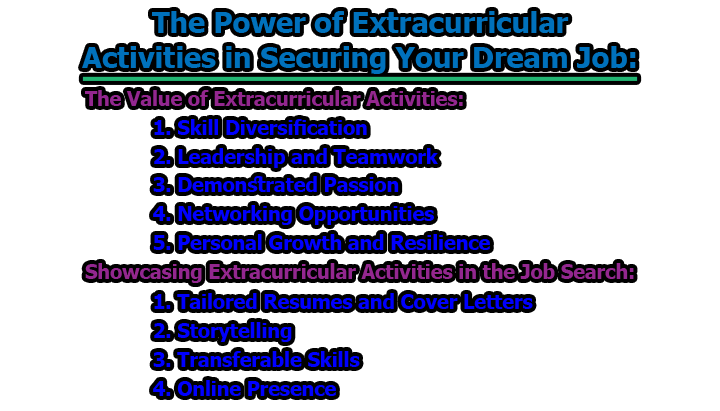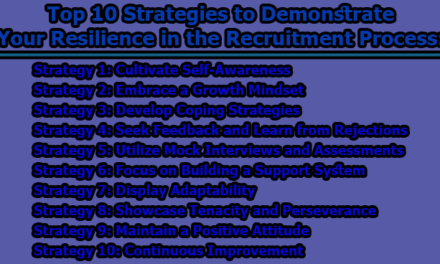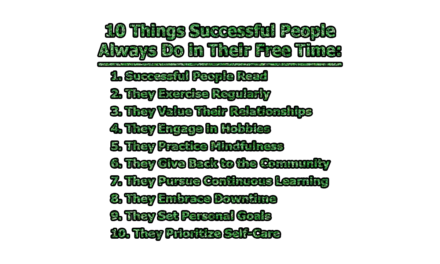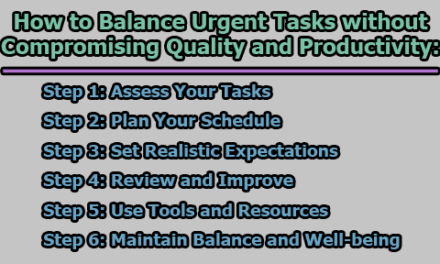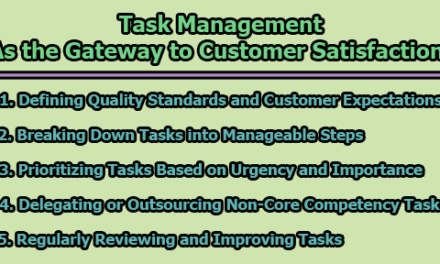The Power of Extracurricular Activities in Securing Your Dream Job:
In the competitive landscape of the modern job market, standing out from the crowd has become more crucial than ever before. As traditional qualifications and skills continue to hold their value, there is a growing emphasis on candidates’ holistic profiles. This has led to a renewed interest in extracurricular activities and their role in enhancing employability. Beyond academics and technical skills, employers are increasingly looking for well-rounded individuals who possess qualities like leadership, teamwork, and adaptability. In this article, we will explore why extracurricular activities can significantly boost your chances of getting hired, the specific skills they cultivate, and how to effectively showcase them in your job search. The power of extracurricular activities in securing your dream job.
The Value of Extracurricular Activities:
Extracurricular activities encompass a wide spectrum of experiences that extend beyond the classroom or workplace. These activities include participation in clubs, sports, community service, cultural organizations, and various other forms of engagement. The value they bring to the table goes far beyond mere hobbies or pastimes. Let’s delve into the myriad ways in which these activities can empower you in your pursuit of career excellence.
1. Skill Diversification: While traditional education and professional training offer specific skills tailored to particular fields, extracurricular activities provide a platform for skill diversification. Engaging in activities outside your main area of study or profession allows you to develop skills that might not be taught in a formal setting. For example, participating in a theater group can enhance your public speaking and creativity, skills that can be beneficial across various career paths.
2. Leadership and Teamwork: Extracurricular activities often involve teamwork and leadership roles that mirror real-world scenarios. Leading a student organization or captaining a sports team hones your ability to manage people, make decisions under pressure, and inspire others. These experiences not only shape your leadership skills but also demonstrate your capacity to collaborate and communicate effectively—attributes highly prized by employers.
3. Demonstrated Passion: Passion is a driving force that propels individuals to excel and contribute meaningfully. Engaging in extracurricular activities showcases your commitment and enthusiasm beyond the requirements of your academic or professional obligations. Employers appreciate candidates who bring a genuine fervor to their work, as it often leads to increased creativity, dedication, and innovative thinking.
4. Networking Opportunities: Extracurricular activities offer a unique platform for networking with like-minded individuals, mentors, and professionals in various fields. The relationships you build during these activities can open doors to opportunities that you might not have encountered otherwise. From making connections that provide job referrals to accessing insider information about industries, networking cultivated through extracurricular pursuits can be a game-changer in your job search.
5. Personal Growth and Resilience: Engaging in extracurricular activities frequently involves stepping outside your comfort zone, facing challenges, and overcoming obstacles. These experiences contribute to personal growth by fostering resilience and adaptability. The ability to persevere in the face of difficulties and setbacks is a quality that employers highly value, as it indicates your capacity to handle the demands of a dynamic work environment.
Showcasing Extracurricular Activities in the Job Search:
Engaging in extracurricular activities is one part of the equation; effectively presenting these experiences to potential employers is equally vital. Here are strategic ways to ensure your extracurricular engagement shines through in your job applications:
- Tailored Resumes and Cover Letters: Aligning with the Job: Crafting a tailored resume and cover letter is the first step in effectively showcasing your extracurricular activities. Rather than creating a generic application, customize your documents to highlight the skills and qualities that are directly relevant to the job you’re applying for.
- Emphasize Relevant Skills: Identify the skills gained from your extracurricular activities that align with the job requirements. For example, if the position involves project management, emphasize your experience in leading a student organization or coordinating events.
- Quantify Achievements: Whenever possible, quantify your accomplishments. Did you raise a specific amount for a charity event? Did you lead a team that achieved a certain outcome? These quantifiable achievements provide concrete evidence of your impact.
- Storytelling: Humanizing Your Experiences: Storytelling is a powerful tool for conveying the significance of your extracurricular activities. Instead of simply listing your involvement, craft narratives that showcase your growth, challenges, and accomplishments during these experiences.
- Provide Context: Share the context behind your participation in an activity. What motivated you to join? What were your initial goals?
- Highlight Challenges: Discuss any obstacles you encountered and how you overcame them. This demonstrates your resilience and problem-solving abilities.
- Show Impact: Illustrate the impact you made through your contributions. Did your efforts lead to increased participation, improved processes, or positive outcomes?
- Transferable Skills: Bridging the Gap: One of the key aspects of showcasing extracurricular activities is demonstrating how the skills you’ve acquired can be transferred to the job you’re pursuing. This requires you to explicitly connect the dots between your extracurricular experiences and the requirements of the position.
- Identify Commonalities: Analyze the job description and identify skills that overlap with those you’ve gained from your activities. Are there any shared qualities, such as leadership, communication, or problem-solving?
- Draw Parallels: Explain how the skills you’ve developed in your extracurricular activities are applicable to the job. For instance, leading a team in a sports activity demonstrates leadership skills that can be utilized in a managerial role.
- Online Presence: Consistency and Engagement: In today’s digital age, your online presence plays a significant role in shaping your professional image. Leverage platforms like LinkedIn to further showcase your extracurricular activities.
- Profile Updates: Incorporate your extracurricular experiences into your online profiles. Be consistent in highlighting the skills and accomplishments you’ve mentioned in your application.
- Content Sharing: Share articles, posts, or projects related to your activities. This demonstrates your ongoing engagement and commitment beyond the immediate experience.
In conclusion, extracurricular activities have transcended their role as mere hobbies to become integral components of a well-rounded individual’s professional portfolio. Their capacity to nurture diverse skills, foster leadership and teamwork capabilities, reveal genuine passion, and drive personal growth is undeniable. As the modern job market evolves, showcasing your extracurricular experiences can be the key to securing your dream job. By aligning your activities with the demands of your target position and effectively communicating their relevance, you position yourself as an exceptional candidate who brings a wealth of unique qualities to the table. So, whether it’s participating in a coding club, volunteering at a local shelter, or engaging in a cultural exchange program, recognize the immense potential of extracurricular activities in shaping your career trajectory. Your journey to professional success is not solely confined to classrooms and workplaces; it is enriched and empowered by the valuable lessons learned and skills acquired through your extracurricular pursuits.
Frequently Asked Questions [FAQs]:
What are extracurricular activities, and why are they important for job seekers?
Extracurricular activities refer to pursuits individuals engage in outside of their academic or professional commitments. These activities offer a range of benefits, including skill diversification, leadership development, networking opportunities, personal growth, and the chance to showcase passion and dedication. They are important for job seekers because they enhance one’s overall profile and provide a competitive edge in a crowded job market.
How can extracurricular activities boost my chances of getting hired?
Engaging in extracurricular activities showcases qualities like leadership, teamwork, adaptability, and a demonstrated passion for personal growth. These qualities are highly valued by employers, as they indicate an individual’s potential to contribute positively to a team and adapt to various work scenarios. Extracurricular experiences differentiate you from other candidates, making you a more well-rounded and attractive prospect for hiring managers.
What types of extracurricular activities should I consider participating in?
The choice of extracurricular activities depends on your interests and goals. Consider activities that align with your passions and allow you to develop skills relevant to your desired career path. This could include joining clubs or organizations related to your field, participating in community service projects, engaging in sports, or taking on leadership roles in student initiatives.
How should I showcase my extracurricular activities on my resume?
When listing extracurricular activities on your resume, focus on the skills you gained and your achievements. Tailor your descriptions to highlight qualities that align with the job you’re applying for. Use bullet points to outline your role, responsibilities, and any quantifiable results you achieved, such as funds raised or projects completed.
How do I discuss my extracurricular activities during job interviews?
During job interviews, use your extracurricular experiences to illustrate relevant skills and qualities. Provide specific examples of challenges you faced, actions you took, and the impact you made. Discuss how these experiences have prepared you for the challenges of the job and demonstrate your enthusiasm for personal growth and contribution.
Can extracurricular activities make up for a lack of job experience?
Extracurricular activities can certainly help mitigate a lack of formal job experience, especially for recent graduates or career changers. They provide evidence of your skills, leadership potential, and dedication, which can compensate for limited work experience. However, a balanced approach that combines both extracurricular activities and relevant internships or part-time jobs is often ideal.
How can I effectively manage my time between work or studies and extracurricular activities?
Time management is crucial when balancing work or studies with extracurricular activities. Prioritize your commitments and set realistic goals for each. Create a schedule that allows you to allocate time to your activities without neglecting your core responsibilities. Effective time management demonstrates your ability to juggle multiple tasks, a skill that employers value.
Are extracurricular activities only relevant for entry-level positions?
Extracurricular activities are valuable across all career stages, from entry-level to senior positions. They showcase qualities that are universally desirable, such as leadership, teamwork, and adaptability. Even seasoned professionals can highlight extracurricular experiences to demonstrate continuous learning, commitment, and a passion for personal growth.
What if I have limited time for extracurricular activities due to work or family commitments?
While it’s important to find a balance between various commitments, even a small amount of involvement in extracurricular activities can have a positive impact. Look for opportunities that fit your schedule, such as online courses, short-term volunteer projects, or participating in professional networking events. The key is to demonstrate your willingness to go beyond your core responsibilities.
How can I ensure that my extracurricular activities align with my career goals?
To ensure alignment between your extracurricular activities and career goals, reflect on the skills and qualities you want to develop. Research activities that offer opportunities to enhance those skills. Seek guidance from mentors, professionals in your desired field, or career advisors to identify extracurricular pursuits that complement your career trajectory.

Library Lecturer at Nurul Amin Degree College

